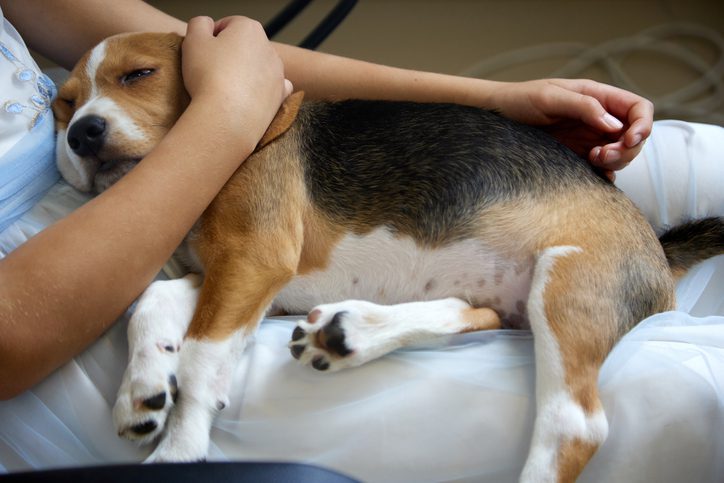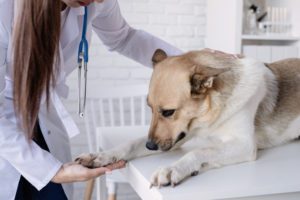Bloat in Dogs: See a Vet if Your Dog is Showing These Bloat Symptoms
Bloat occurs when the abdomen is full or distended. Bloat can be triggered by a number of circumstances, including gorging, constipation, or Cushing’s Disorder.
You cannot ignore this symptom if your dog has a swollen belly. While it could be something as benign as eating too much or too fast, it could also be life-threatening. You should always assume that bloat is serious enough to take your pup to the vet.
Bloat can cause a pot-bellied appearance in dogs, sometimes resulting from a medical condition. If you want to discover more about dogs’ bloat, follow on with this article.
What Are the Indications of Bloating in Dogs?
Most of the time, the symptoms of bloating in dogs correspond with the cause of the bloat. However, certain types of bloating have distinct symptoms, especially concerning gastric dilatation and volvulus. There are several cautionary indications you need to watch out for in your canine:
- Swollen or distended abdomen
- Attempts to vomit but unsuccessful
- Panting or rapid breathing
- Pain in the abdomen
- Pacing or restlessness
- Collapse or inability to stand
You must get your dog to the emergency vet if your pup demonstrates any of the above symptoms. Gastric dilatation volvulus is an insidious condition that can become fatal within a short period of a couple of hours. Go to the vet!

What Causes Bloat in Canines
There are lots of reasons for bloating in canines. Bloat does not always indicate a serious condition, but It is essential to distinguish between the various types of bloat in dogs to be able to help them. The following includes some of the different causes of bloat:
Overeating
Sometimes dogs can be overzealous about their eating. They may eat very fast and become bloated as a result. You can try not feeding them one big meal instead of feeding your pup smaller amounts of food throughout the day. You may also choose to try to feed them in a slow feeder bowl. This way, they will learn to eat in smaller portions, which is better for their health.
Eating from an elevated food bowl may also cause distress. A raised feeder encourages your pup to eat at a faster-than-normal pace. Eating dry food that contains fat or oil within the first four ingredients can also precipitate bloat. Eating moistened dry food, especially when citric acid is used as a preservative, can also increase the risk of bloat.
Eating Non-Food Items
Let’s face it; sometimes dogs do the most unusual things, like eating something they should not. If your pooch ingests a non-food item, such as grass or one of your kid’s toys, it can trigger distention of the stomach. Some other non-food items your dog can swallow and causes bloat:
- Stuffing from their bedding
- Your socks or underwear
- Mulch from the yard
- Dirt from outside
If your dog has swallowed any of the above or any other non-food item, it can cause an obstruction, which can be life-threatening, and surgery may be required to remove the non-food item. If your canine has gobbled a foreign object, you should get them to the vet immediately.
Constipation
Your dog may experience discomfort and bloat due to constipation. Some of the frequent explanations for constipation in canines are a lack of physical activity and a poor diet. Constipated pups may have pain when attempting to pass stool, and there may be redness or swelling around their anus.
The little stool that may be produced is often small, hard, and dry, and it can cause painful bloating. Constipation can be a significant sign of intestinal blockage. Most dogs usually defecate once or twice a day. However, if your dog goes more than 48 to 72 hours without passing stool, you should take them to the vet.
Abdominal Fluid
There can be an accumulation of fluid inside your dog’s abdominal cavity, which causes bloating. Their belly can get bigger, and they may even develop a pot-bellied appearance. Some of the health conditions that may cause bloat in dogs:
- Problems in the kidneys or liver
- Low levels of protein in the blood
- Right-sided congestive heart failure
- Nephritic syndrome
Nephritic syndrome occurs when the dog has protein in the urine and high cholesterol in the blood. In addition to stomach bloating, fluid in the abdomen can cause vomiting and appetite loss. If you suspect your pup may be sick and experiencing abdominal bloat, take your canine to the vet as soon as possible.
Gastric Dilatation and Volvulus
Gastric dilatation and volvulus, or GDV, is a severe veterinary emergency that must be treated promptly. In the early stages, the stomach fills with gas and causes bloat. However, sometimes it can go beyond bloating, and it becomes volvulus. Volvulus occurs when the gas-filled stomach twists and the opening and exit of the stomach are obstructed.
This condition is extremely serious, and it requires urgent life-saving surgery. The distended stomach pushes out the rib cage, and bloating occurs, and it is more obvious on the left. The pups often begin to have difficulty breathing. If you note any of these signs, take your pooch to the vet.
Cushing’s Disorder
Cushing’s disease appears when the dog’s adrenal glands create too many certain hormones. A growth in the pituitary or adrenal glands normally produces it. Some of the symptoms of Cushing’s disease:
- Intolerance to heat
- Appetite increase
- Increased urine output
- Increased water consumption
- Muscle weakness
- Poor hair coat
Many dogs with Cushing’s disease develop stomach bloat or a pot-bellied appearance due to increased fat within the abdomen and the stretching of the abdominal wall. Elevated liver enzymes and high cholesterol are both markers for Cushing’s disease in dogs.
Intestinal Parasites
Parasites like ringworm and hookworm lead to a bloated appearance. Puppies can be infected, which impedes the puppy’s growth and leads to excessive gas in the stomach. Some of the symptoms of intestinal parasites:
- Diarrhea (with or without blood)
- Poor hair coat
- Pale gums
- Weight loss
- Scooting
- Vomiting
Many monthly heartworm medications protect your dog from heartworm and act as a dewormer to prevent intestinal parasites. Sometimes the symptoms of intestinal parasites are difficult to identify. You should make sure you get your pup to the vet for a check-up a minimum of once a year. Your vet will evaluate your pooch for parasites.

What Dogs Are More at Risk for Stomach Bloat?
Some breeds, such as the German Shepherd or the Standard Poodle, are more susceptible due to their larger size. Deep-chested breeds are also prone to bloat. Older pups are more at risk for the condition. Leaner dogs are more at risk due to the lack of abdominal fat, making it easier for the stomach to bloat.
If a dog has family or relatives that have suffered from bloat, chances are greater they will develop bloat. Male dogs are more likely to have bloat compared to female canines. You should also be mindful of how much food your dog eats in a sitting, as overeating can trigger bloat.
Conclusion
Bloat can result from your dog eating too much or too fast. However, if you see any of the symptoms mentioned in this article, you must get your canine companion to the vet immediately, as the condition can be fatal.
For pet emergencies in Atlanta, GA, The Village Vets has a 24/7 emergency location in Decatur, GA. If your pet is facing an emergency, give them a call at (404) 371-9774.

